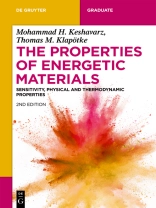For a chemist who is concerned with the synthesis of new energetic compounds, it is essential to be able to assess physical and thermodynamic properties, as well as the sensitivity, of possible new energetic compounds before synthesis is attempted. Various approaches have been developed to predict important aspects of the physical and thermodynamic properties of energetic materials including (but not limited to): crystal density, heat of formation, melting point, enthalpy of fusion and enthalpy of sublimation of an organic energetic compound. Since an organic energetic material consists of metastable molecules capable of undergoing very rapid and highly exothermic reactions, many methods have been developed to estimate the sensitivity of an energetic compound with respect to detonationcausing external stimuli such as heat, friction, impact, shock and electrostatic discharge. This book introduces these methods and demonstrates those methods which can be easily applied.
A propos de l’auteur
Professor Dr. Thomas M. Klapötke has been Professor of Inorganic Chemistry at the Ludwig Maximilian University of Munich (LMU) since 1997. Currently he does research at the University of Munich with a group of about 30 employees, mainly on explosives. According to media reports, Klapötke directs the ‘only university chemistry lab in Germany that deals with defense.’ He is researching ecological explosives in Munich on behalf of the US military.
Professor Dr. M. H. Keshavarz;












